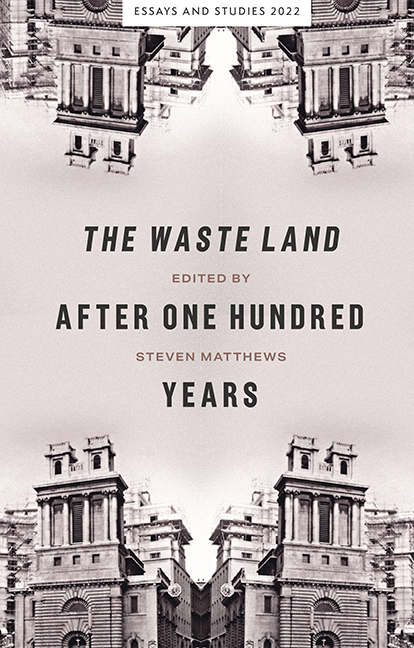Book contents
- Frontmatter
- Contents
- Notes on Contributors
- Introduction
- 1 A ‘Dangerous Model’: Resisting The Waste Land
- 2 Beyond the Sanskrit Words: Eliot and the Colonial Construction of Poetic Modernism
- 3 ‘An Icon of Recurrence’: The Waste Land’s Anniversaries
- 4 ‘O City, city’: Sounding The Waste Land
- 5 Lost and Found in Translation: Foreign Language Citations in The Waste Land
- 6 The Poetic Afterlife of The Waste Land
- 7 Compositional Process and Critical Product
- 8 Hypocrisy and After: Persons in The Waste Land
- Index
8 - Hypocrisy and After: Persons in The Waste Land
Published online by Cambridge University Press: 08 October 2022
- Frontmatter
- Contents
- Notes on Contributors
- Introduction
- 1 A ‘Dangerous Model’: Resisting The Waste Land
- 2 Beyond the Sanskrit Words: Eliot and the Colonial Construction of Poetic Modernism
- 3 ‘An Icon of Recurrence’: The Waste Land’s Anniversaries
- 4 ‘O City, city’: Sounding The Waste Land
- 5 Lost and Found in Translation: Foreign Language Citations in The Waste Land
- 6 The Poetic Afterlife of The Waste Land
- 7 Compositional Process and Critical Product
- 8 Hypocrisy and After: Persons in The Waste Land
- Index
Summary
Italo Calvino's If on a winter's night a traveler opens with these words: ‘You are about to begin reading Italo Calvino's new novel, If on a winter's night a traveler’. This is almost true. The book is not a novel, and we have already started. Various instructions follow, which may or may not apply. Perhaps there isn't a ‘TV always on in the next room’, and we may not have gone ‘to the bookshop and bought the volume’. We could have borrowed it from a library or a friend. In any case, most of the possible truths soon disappear. ‘You’ becomes a male (still true for some of us) and a full-blown fictional character (not so true), meets a female reader, and by the end of the book is married to her. She says ‘Aren't you tired of reading?’ And you say, ‘Just a moment, I’ve almost finished If on a winter's night a traveler by Italo Calvino.’
There are plenty of fictions where a grammatical second person becomes a character within the story – I think of Michel Butor's La Modification, with its use of ‘Vous’, second-person, to refer to its middle-aged male protagonist. Perhaps every ‘you’ in a text, whether novel or poem or newspaper article, combines an actual address with some sort of fantasy. But it's still hard to think of ‘you’ as the name of a character, and to keep ourselves disentangled from the conversation that is not quite taking place. This is why I am suggesting that Calvino may be quite a good guide to The Waste Land.
I’d like to call on two other helpers, though, before getting down to work. ‘He imposes orders as he thinks of them’, Wallace Stevens says of ‘the maker of fictions’; ‘It is a brave affair’. I take it the irony in the last phrase suggests not that the affair is not brave, just that it is not as brave as it thinks it is. It is what poets and critics do. Or, to follow a distinction made by Frank Kermode, a great reader of Stevens, ‘poets … help us to make sense of our lives’, while ‘critics … attempt the lesser feat of making sense of the ways we try to make sense of our lives’.
- Type
- Chapter
- Information
- The Waste Land after One Hundred Years , pp. 179 - 194Publisher: Boydell & BrewerPrint publication year: 2022

